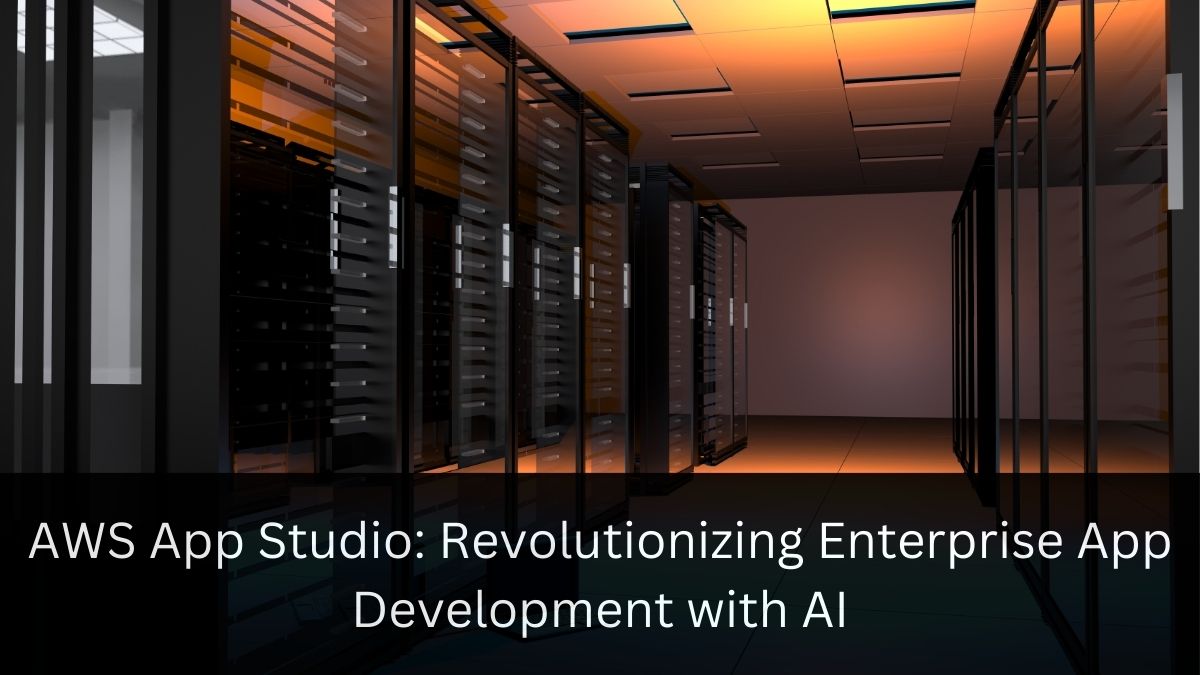Press Release
AWS App Studio: Revolutionizing Enterprise App Development with AI

In the rapidly evolving landscape of generative AI, Amazon Web Services (AWS) has made a significant leap forward with the introduction of App Studio. This innovative tool promises to transform the way enterprise applications are created, potentially bridging the gap between technical expertise and professional development skills.
The Promise of App Studio
App Studio’s core proposition is both simple and revolutionary: create enterprise-grade software applications from a written prompt. This approach aims to empower technical professionals who may lack traditional coding skills to build complex, functional applications without the need for a dedicated development team.
Breaking Down the Barriers
Sriram Devanathan, GM of Amazon Q Apps and AWS App Studio, explains the target audience: “App Studio is for technical folks who have technical expertise but are not professional developers, and we’re enabling them to build enterprise-grade apps.” This vision extends to IT professionals, data engineers, enterprise architects, and even product managers who possess deep company knowledge but may lack coding proficiency.
How App Studio Works
The process of creating an application with App Studio is surprisingly straightforward:
- Name Your Application: Start by giving your project a name.
- Define Data Sources: Specify the data sources your application will use.
- Describe Your Vision: Provide a written description of the application you want to build.
Refining Requirements
Once you’ve outlined your application, App Studio generates a list of requirements based on your description. Users can then interact with the AI to refine these requirements, ensuring the final product aligns closely with their vision.
From Concept to Deployment
After the requirements are finalized, App Studio takes care of the rest. It generates the necessary code, creates a user interface, and even sets up a mini DevOps pipeline for testing before production. This streamlined process significantly reduces the time and resources typically required for enterprise app development.
The Technology Behind App Studio
App Studio leverages multiple AI models running on Amazon Bedrock, including Amazon Titan and Anthropic. This multi-model approach allows the system to select the most appropriate AI for each specific task in the app development process.
Distinguishing Features
While App Studio may seem similar to existing no-code tools, Devanathan emphasizes a key difference: “Where App Studio is different is in the way we use GenAI to really reduce your learning curve. I’d say there’s almost no learning curve.”
Traditional no-code platforms often require users to understand specific paradigms and visual interfaces. App Studio, on the other hand, aims to eliminate this learning curve entirely by utilizing natural language processing and generative AI.
Real-World Applications
The potential applications for App Studio are vast. Some examples include:
- Inventory tracking systems
- Claims approval processes
- Customer relationship management (CRM) tools
- Project management dashboards
These applications can be tailored to specific industry needs, potentially revolutionizing how businesses approach internal software development.
Security and Governance
Enterprise-grade applications require robust security measures and governance protocols. App Studio addresses these concerns by allowing administrators to link existing systems during setup. AWS then handles all back-end security and governance based on the provided information, ensuring that generated applications meet enterprise standards.
The Implications for Enterprise Software Development
The introduction of App Studio could have far-reaching implications for the enterprise software development landscape:
Democratizing App Development
By lowering the barrier to entry for app creation, App Studio has the potential to democratize software development within organizations. This could lead to more innovative solutions coming from various departments, not just IT.
Increased Efficiency
The ability to rapidly prototype and deploy applications could significantly reduce development time and costs. This efficiency could allow businesses to be more agile in responding to market changes or internal needs.
Changing Roles in IT
As tools like App Studio become more prevalent, the role of traditional developers may evolve. There could be a shift towards more specialized development tasks, with generalist app creation becoming more accessible to a broader range of professionals.
Looking Ahead
While App Studio is currently in preview, its potential impact on enterprise software development is significant. As the tool matures and more organizations adopt it, we may see a shift in how businesses approach their software needs.
However, it’s important to note that while App Studio promises to simplify app creation, it’s not a replacement for professional developers. Complex, mission-critical applications will likely still require the expertise of skilled programmers.
AWS App Studio represents a bold step forward in the world of enterprise application development. By harnessing the power of generative AI, it has the potential to transform how organizations approach software creation. As we move further into the age of AI-assisted development, tools like App Studio may become instrumental in shaping the future of enterprise software.
While it’s too early to predict the full impact of App Studio, one thing is clear: the landscape of enterprise app development is changing, and AWS is positioning itself at the forefront of this revolution.
